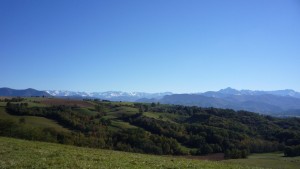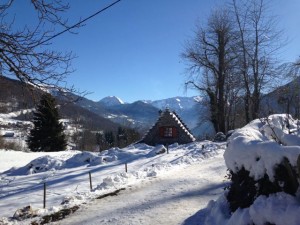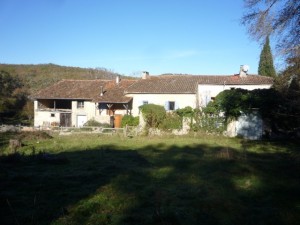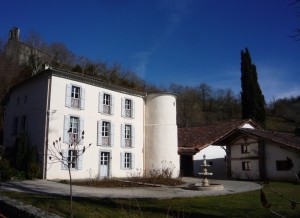As far as French property prices are concerned, the Ariège region, which has historically had a very stable (and incredibly good value) property market, is seeing a gradual rise in prices. Last year, the Ariège had one of the largest property price rises in France according to the association of Notaires in France. This is perhaps down to the fact that foreign buyers have started to discover this beautiful region and all it has to offer. Buyers daring to cast their nets that little bit wider have discovered what beautiful properties, fantastic opportunities and great value is still to be had in the Ariège. So much so, it is threatening to become the property hotspot for 2015. Property here is still very affordable, but that may not continue for much longer.
Top of the property wish list of those looking to buy in the Ariège are stone-built farmhouses which are still to be found for attractive prices. These properties usually have great views with the Pyrénées as a backdrop and are generally positioned to make the most of the summer sun and protect from the winter chill. Built from stone, they are usually spacious and come with outbuildings and a good amount of land.
For those wanting a project, it is also still possible to find plenty of houses needing renovation here which is becoming more difficult in other areas of France. In addition, many investors are looking to buy property large enough to run holiday accommodation – interestingly, the Ariège must be one of the last few remaining areas of France where there is actually a shortage of holiday letting accommodation, particularly close to St-Girons. Setting up a gîte or bed-and-breakfast with your new French property may prove to be a very sensible business decision and offer good returns on your investment.
For everyone interested in mountain sports, it is still possible to buy a wooden shepherd’s hut in the mountains, minutes away from the ski slopes and walking and biking trails and complete with stunning views. Agriculture has always played a crucial role in the economy of the Ariège and thus the valleys and hills are dotted with their characteristic stone barns with the typical ‘ardoise’ slate roofs. Nowadays, many of the barns have been converted into lovely, characterful homes or into luxury ski chalets but there are still a few unconverted barns available for sale although these properties are becoming more and more sought after. However, that dream of owning a chalet or mountain retreat is still achievable in the Ariège… at the moment.
It seems that the secret of this undiscovered and very special region is out so if you don’t want to miss your chance, maybe now is the time to discover the beautiful Ariège. If you need some help finding your perfect house in an idyllic location, please get in touch: nadia@foothillsoffrance.com
|
Viewing your potential dream home for the first time is one of the most exciting aspects of house hunting. There are, however, a few things to bear in mind during and after a viewing to help you decide if it really is the house for you. 1.Location first 2. Be nosey 3. Overall look 4. Irregular rooms 5. Manners 6. Communicate with your property finder or agent 7. If you’re genuinely interested, start asking questions 8. Do a second viewing Of course, when buying a house, you have to have the right feeling about it and I see time and again how a property can tick every box on the wish-list and yet just not ‘feel’ right when the buyer views. This is the advantage of using a property finder who will have already pointed out all the pros and cons of each property and make sure it ticks all the boxes so that, armed with all the relevant information, you can at least feel confident in letting your feelings take over when you view.
There is no doubt that the property market is a seasonal business here in France, just as in most countries, which begs the question, is there an optimum time to buy a house here and are there certain times that buyers should avoid? According to the LPI (l’Observatoire de Les Professionnels de L’immobilier) of SeLoger.com, in France almost 45% of Compromis de Vente (exchange of contract) are signed between March and July with the peak in June and July (19%). Between September and November, 28% are signed with another peak in October (more than 10%). Which all means that there is a 50% difference in the number of signings between the peak months (July and October) and the quietest months (February, August, November and December). Winter tends to be a slow period because many buyers prefer to hibernate and put off house hunting until the Spring. In August many people are on holiday and the market slows again. Even more interesting for potential buyers is that these peak periods do not necessarily correspond to the highest asking prices. So, for example, in October, a month of very high demand for property, prices are in fact 2% lower than other times of year. The explanation for this is apparently that, in October, there are the highest number of properties for sale on the market, hence greater competition for sellers to attract a buyer resulting in a corresponding drop in price. At other periods however, quieter times in the property market do tend to result in lower accepted prices. The August drop in both sales and prices is interesting and I would guess exclusive to France (and southern European countries) where everyone is on holiday and many businesses, including estate agents and Notaires, shut up shop. So despite the fact that there are plenty of buyers in August – certainly it is a busy time of year for me – the sellers and marketeers/facilitators are not there. Also worth noting in the same study is that for the properties for sale at ‘petits prix’ (the lowest price properties), sales, viewings and prices are pretty much stable throughout the year. In summary, according to the statistics, the best time of the year to buy a house is either when there are very few other people looking (winter and August) or in the months when there is the most property on the market (March-October). In both these periods, you have more bargaining power. However, there are of course advantages and disadvantages to buying both when the market is busy and when it is slow. While you might get a better deal through the slow winter and holiday seasons, you will also have fewer houses to choose from so it might be harder to find your dream home. Likewise, in the peak months, negotiation may be harder and you might end up paying more but, if you lose one house, you will have more chance of finding something else equally as good. Remember too that searching for and buying a house in France can be a long process so, although you may start looking in May, you could easily not complete on your house until December. Hence, although it is worth bearing in mind the statistics and fluctuations in the property market throughout the year, in the end you should stick to the schedule that suits you best – especially if you have a property finder on your side who knows what the prices should be and how to negotiate and get the very best deal for you whatever the time of year. |
||
|
Nadia Jordan is an Agent Commercial en Immobilier for Maisons et Manoirs / SIRET 401777602 / No TVA FR51-401777602 / Carte Professionnelle no259T(Gers) Copyright © 2025 Foothills of France - All Rights Reserved Log in |
||










You must be logged in to post a comment.